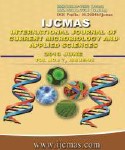


 National Academy of Agricultural Sciences (NAAS)
National Academy of Agricultural Sciences (NAAS)

|
PRINT ISSN : 2319-7692
Online ISSN : 2319-7706 Issues : 12 per year Publisher : Excellent Publishers Email : editorijcmas@gmail.com / submit@ijcmas.com Editor-in-chief: Dr.M.Prakash Index Copernicus ICV 2018: 95.39 NAAS RATING 2020: 5.38 |
High yield potentiality of summer rice motivates farmers in West Bengal to grow rice even in summer season. Summer rice receives few fold higher irrigation over other aerable crops. Farmers of this area irrigate 1300-1400 mm water for summer rice. In Nadia district of West-Bengal during summer season, the main source of irrigation water is ground water which contains high amount (0.098-0.345 mgL-1) of arsenic which is responsible for higher arsenic concentration in grain and straw. A field experiment was carried out during February to May, 2014 with six irrigation regimes. The irrigation regimes were I1- Continuous ponding, I2- Intermittent ponding, where irrigation was given two days after disappearance of ponded water, I3- Intermittent ponding, irrigation was given four days after disappearance of ponded water, I4- Saturation with SRI transplanting, I5- Intermittent ponding, irrigation was given two days after disappearance of ponded water, I6- Raised and sunken bed in a ratio of 1:2. Soil water stress in I2 and I4 were imposed during 15 to 40 days after transplanting, However, in case of I5 stress imposition stage was 65 to 80 DAT. Rest period for I2, I3, I4 and I5 regime field was kept under continuous ponding situation. Results showed that the grain (0.52 mgkg-1) and straw (3.05 mgkg-1) arsenic content were significantly less in I4 where (36.4%) less water was irrigate over I1. No significant yield reduction was found under I4 (6.47 Mg ha-1) as compare to I1 (6.64 Mg ha-1). Application of 100 mm and 380 mm less water respectively under I5 and I6 showed decrease in grain arsenic content by 36.7% and 26.6% respectively. Raise and sunken bed can effectively decrease grain arsenic content. But all three regimes significantly decrease grain yield. To reduce arsenic content in rice grain and straw without affecting yield, the field should be kept saturated during 15-40 days after transplanting.
 |
 |
 |
 |
 |